Past Chancellors
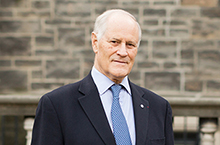 The Hon. William C. Graham: 12th Chancellor of Trinity College. Click here to read Chancellor Graham’s bio
The Hon. William C. Graham: 12th Chancellor of Trinity College. Click here to read Chancellor Graham’s bio
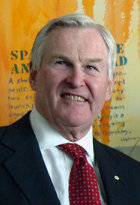 The Hon. Michael Holcombe Wilson (BCom 1959, DSL Hon 1994) first arrived at Trinity College as a 17-year-old in September 1955. Wilson served as a federal Progressive Conservative MP, and as a senior member of the cabinet of Prime Minister Brian Mulroney. In addition to his duties as Chancellor and as chair of UBS Global Management, Wilson juggled a range of charitable activities, from fundraising for mental health and neuroscience, to membership in Trinity’s Strength to Strength Campaign. In February of 2006, he was appointed Canada’s Ambassador to Washington. Michael Wilson was the 33rd Chancellor of University of Toronto from 2012-2018.
The Hon. Michael Holcombe Wilson (BCom 1959, DSL Hon 1994) first arrived at Trinity College as a 17-year-old in September 1955. Wilson served as a federal Progressive Conservative MP, and as a senior member of the cabinet of Prime Minister Brian Mulroney. In addition to his duties as Chancellor and as chair of UBS Global Management, Wilson juggled a range of charitable activities, from fundraising for mental health and neuroscience, to membership in Trinity’s Strength to Strength Campaign. In February of 2006, he was appointed Canada’s Ambassador to Washington. Michael Wilson was the 33rd Chancellor of University of Toronto from 2012-2018.
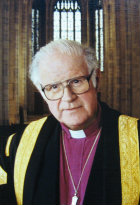 Chancellor John Bothwell was born in Toronto and studied at the University of Toronto where he obtained a BA in 1948 followed by a Licentiate in Theology and a BDiv from Trinity College. He was ordained an Anglican deacon and priest and served in parishes in Toronto, Vancouver, Oakville and Dundas. He served as National Executive Director of Program, was elected Diocesan Bishop of Niagara in 1973. Elected Archbishop of the Province of Ontario in 1985, he served until his retirement in 1991. Archbishop Bothwell travelled extensively in Britain, Africa, Latin America and the Caribbean. He authored three books on the church and its role in society.
Chancellor John Bothwell was born in Toronto and studied at the University of Toronto where he obtained a BA in 1948 followed by a Licentiate in Theology and a BDiv from Trinity College. He was ordained an Anglican deacon and priest and served in parishes in Toronto, Vancouver, Oakville and Dundas. He served as National Executive Director of Program, was elected Diocesan Bishop of Niagara in 1973. Elected Archbishop of the Province of Ontario in 1985, he served until his retirement in 1991. Archbishop Bothwell travelled extensively in Britain, Africa, Latin America and the Caribbean. He authored three books on the church and its role in society.
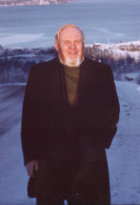 Chancellor Robert Lowder Seaborn was born in Toronto and completed high school at the U of T Schools. He earned a BA in Classics in 1932 and a degree in Divinity at Trinity College, followed by studies at Oxford University. During the Second World War, Seaborn was posted overseas, serving as Padre for the 1st Battalion, Canadian Scottish Regiment, and participated in the D-Day Normandy Landings. He won a Military Cross during the Juno Beach landing for carrying the wounded to safety while under fire. He was awarded the “Croix de Guerre” by the French Government. On July 15, 1944, he appeared in a photograph giving absolution to an unknown soldier, one of the iconic images of the Second World War. Seaborn later returned to Ontario and served as Bishop Ordinary to the Canadian Forces from 1980 to 1986.
Chancellor Robert Lowder Seaborn was born in Toronto and completed high school at the U of T Schools. He earned a BA in Classics in 1932 and a degree in Divinity at Trinity College, followed by studies at Oxford University. During the Second World War, Seaborn was posted overseas, serving as Padre for the 1st Battalion, Canadian Scottish Regiment, and participated in the D-Day Normandy Landings. He won a Military Cross during the Juno Beach landing for carrying the wounded to safety while under fire. He was awarded the “Croix de Guerre” by the French Government. On July 15, 1944, he appeared in a photograph giving absolution to an unknown soldier, one of the iconic images of the Second World War. Seaborn later returned to Ontario and served as Bishop Ordinary to the Canadian Forces from 1980 to 1986.
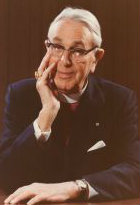 Chancellor Howard Hewlett Clark (1903-1983) was born in Fort Macleod, Alberta. Clark attended Trinity College, receiving his Divinity Testamur in 1930 and a BA in 1932. He was Bishop of the Diocese of Edmonton from 1954 to 1961 and Bishop of Rupert’s Land from 1961 to 1970. He was elected Primate of the Anglican Church of Canada in 1959; in this position he established the Primate’s World Relief and Development Fund, and in 1964 he hosted the world-wide Anglican Congress. In 1970, he was made a Companion of the Order of Canada.
Chancellor Howard Hewlett Clark (1903-1983) was born in Fort Macleod, Alberta. Clark attended Trinity College, receiving his Divinity Testamur in 1930 and a BA in 1932. He was Bishop of the Diocese of Edmonton from 1954 to 1961 and Bishop of Rupert’s Land from 1961 to 1970. He was elected Primate of the Anglican Church of Canada in 1959; in this position he established the Primate’s World Relief and Development Fund, and in 1964 he hosted the world-wide Anglican Congress. In 1970, he was made a Companion of the Order of Canada.
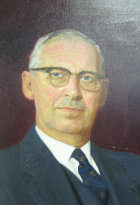 Richard Berkinshaw attended Upper Canada College, Trinity College (BA 1913) and Osgoode Hall. After serving in the First World War, he practised corporate law with a Toronto firm until 1920, when he joined the Goodyear Tire and Rubber Co. of Canada. He became general manager and treasurer in 1933. He played a major role in Canada’s industrial mobilization during the Second World War as chairman of the Wartime Industries Control Board, president of Polymer Corp and director general of the Priorities Branch of the Department of Munitions and Supply. He was created a CBE in 1946. Berkinshaw returned to Goodyear 1945, becoming president 1952 and chairman 1959.
Richard Berkinshaw attended Upper Canada College, Trinity College (BA 1913) and Osgoode Hall. After serving in the First World War, he practised corporate law with a Toronto firm until 1920, when he joined the Goodyear Tire and Rubber Co. of Canada. He became general manager and treasurer in 1933. He played a major role in Canada’s industrial mobilization during the Second World War as chairman of the Wartime Industries Control Board, president of Polymer Corp and director general of the Priorities Branch of the Department of Munitions and Supply. He was created a CBE in 1946. Berkinshaw returned to Goodyear 1945, becoming president 1952 and chairman 1959.
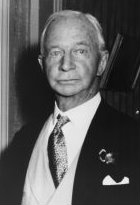 Chancellor Gerard Brakenridge Strathy (1880-1963) was born in Barrie. He was educated in England and Switzerland. He also attended Trinity College School, Port Hope, before entering Trinity College in 1897. He obtained a BA in 1900 and an MA in 1902. He was called to the bar in 1903, and became a partner in Strathy, Cowan and Setterington in 1926. Strathy was on active service in the First World War. He was a member of the Trinity College Senate, 1911 to 1952, Corporation (for 56 years until his death) and Executive Committee of Convocation. In 1954, he was installed Chancellor of Trinity College, an office that had been vacant for 27 years.
Chancellor Gerard Brakenridge Strathy (1880-1963) was born in Barrie. He was educated in England and Switzerland. He also attended Trinity College School, Port Hope, before entering Trinity College in 1897. He obtained a BA in 1900 and an MA in 1902. He was called to the bar in 1903, and became a partner in Strathy, Cowan and Setterington in 1926. Strathy was on active service in the First World War. He was a member of the Trinity College Senate, 1911 to 1952, Corporation (for 56 years until his death) and Executive Committee of Convocation. In 1954, he was installed Chancellor of Trinity College, an office that had been vacant for 27 years.
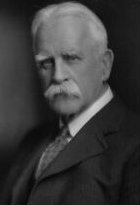 Chancellor John Austin Worrell (1852-1927) was educated at Trinity College School in Weston before entering Trinity College where he received a BA in 1871, an MA in 1875, a BCL in 1880 and a DCL in 1898. He was called to the bar in 1878 and practised in Toronto. He was solicitor to the Bank of Montreal and partner in the firm Crombie, Worrell & Gwynne. He was created QC in 1889 and was elected president of the County of York Law Association in 1895. Worrell was also delegate and lay secretary to the General Synod of the Church of England in Canada, and served as chancellor of the Diocese of Toronto from 1897 to 1927.
Chancellor John Austin Worrell (1852-1927) was educated at Trinity College School in Weston before entering Trinity College where he received a BA in 1871, an MA in 1875, a BCL in 1880 and a DCL in 1898. He was called to the bar in 1878 and practised in Toronto. He was solicitor to the Bank of Montreal and partner in the firm Crombie, Worrell & Gwynne. He was created QC in 1889 and was elected president of the County of York Law Association in 1895. Worrell was also delegate and lay secretary to the General Synod of the Church of England in Canada, and served as chancellor of the Diocese of Toronto from 1897 to 1927.
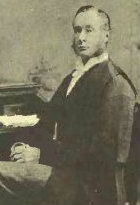 Chancellor Christopher Robinson, QC (1828-1905) was the third son of Sir John Beverley Robinson. A lawyer educated at King’s College, he took an ad eundum degree at Trinity College and was called to the bar in 1850. As a prosecutor, he was involved in the trials of Thomas D’Arcy McGee and Louis Riel. In his later career, he represented Canada in international disputes involving the Bering Sea and the Alaska boundaries. The Chancellorship of Trinity College was the only public office he accepted. Robinson declined a knighthood in 1894.
Chancellor Christopher Robinson, QC (1828-1905) was the third son of Sir John Beverley Robinson. A lawyer educated at King’s College, he took an ad eundum degree at Trinity College and was called to the bar in 1850. As a prosecutor, he was involved in the trials of Thomas D’Arcy McGee and Louis Riel. In his later career, he represented Canada in international disputes involving the Bering Sea and the Alaska boundaries. The Chancellorship of Trinity College was the only public office he accepted. Robinson declined a knighthood in 1894.
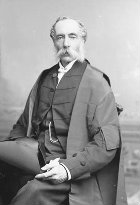 George William Allan attended Upper Canada College and was called to the bar in 1846. He travelled extensively in Europe, Africa and the Middle East and was elected Fellow of the Royal Geographical Society. His political career began in Toronto where he was an alderman and later Mayor. One of the first members of the Senate, he was Speaker from 1888 until 1891 and remained in the Upper House until his death. Allan was an important patron of the artist Paul Kane and presided over such bodies as the Royal Canadian Institute, the Ontario Society of Artists, the Toronto Conservatory of Music and the Ontario Historical Society. In 1856, he gave a 5-acre plot of land to the city which became the Allan Gardens.
George William Allan attended Upper Canada College and was called to the bar in 1846. He travelled extensively in Europe, Africa and the Middle East and was elected Fellow of the Royal Geographical Society. His political career began in Toronto where he was an alderman and later Mayor. One of the first members of the Senate, he was Speaker from 1888 until 1891 and remained in the Upper House until his death. Allan was an important patron of the artist Paul Kane and presided over such bodies as the Royal Canadian Institute, the Ontario Society of Artists, the Toronto Conservatory of Music and the Ontario Historical Society. In 1856, he gave a 5-acre plot of land to the city which became the Allan Gardens.
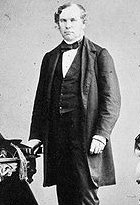 John Hilliard Cameron, QC (1817-1876) was born in Blendecques, France. In 1825, he came with his family to Kingston in Upper Canada. He studied at Upper Canada College. He then studied law with Henry John Boulton. During the Upper Canada Rebellion, he served with the Queen’s Rangers. In 1838, he was called to the bar and practised with James McGill Strachan, son of Bishop Strachan. In 1846, he became a Queen’s Counsel. Cameron served on Toronto city council and was treasurer for the Law Society of Upper Canada. A founding member of Trinity College, he also taught in the Faculty of Law.
John Hilliard Cameron, QC (1817-1876) was born in Blendecques, France. In 1825, he came with his family to Kingston in Upper Canada. He studied at Upper Canada College. He then studied law with Henry John Boulton. During the Upper Canada Rebellion, he served with the Queen’s Rangers. In 1838, he was called to the bar and practised with James McGill Strachan, son of Bishop Strachan. In 1846, he became a Queen’s Counsel. Cameron served on Toronto city council and was treasurer for the Law Society of Upper Canada. A founding member of Trinity College, he also taught in the Faculty of Law.
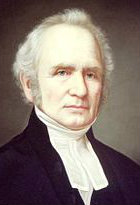 John Beverley Robinson (1791-1863) was born at Berthier, Lower Canada. From 1799 to 1807 the young Robinson studied with John Strachan, first in Kingston and later in Cornwall where he lived in the Strachan household. Teacher and pupil remained lifelong friends. He fought with Isaac Brock in the War of 1812 at Queenston and was subsequently named Attorney General. In 1820, he was elected to the Legislature of Upper Canada, representing York, and in 1829 became Chief Justice. Robinson was named Chancellor of Trinity College at its opening, and remained in this position until his death. His portrait hangs over the fireplace in Strachan Hall. It is a copy, by Sir Edmund Wyly Grier, of the original in Osgood Hall by G.T. Berthon.
John Beverley Robinson (1791-1863) was born at Berthier, Lower Canada. From 1799 to 1807 the young Robinson studied with John Strachan, first in Kingston and later in Cornwall where he lived in the Strachan household. Teacher and pupil remained lifelong friends. He fought with Isaac Brock in the War of 1812 at Queenston and was subsequently named Attorney General. In 1820, he was elected to the Legislature of Upper Canada, representing York, and in 1829 became Chief Justice. Robinson was named Chancellor of Trinity College at its opening, and remained in this position until his death. His portrait hangs over the fireplace in Strachan Hall. It is a copy, by Sir Edmund Wyly Grier, of the original in Osgood Hall by G.T. Berthon.